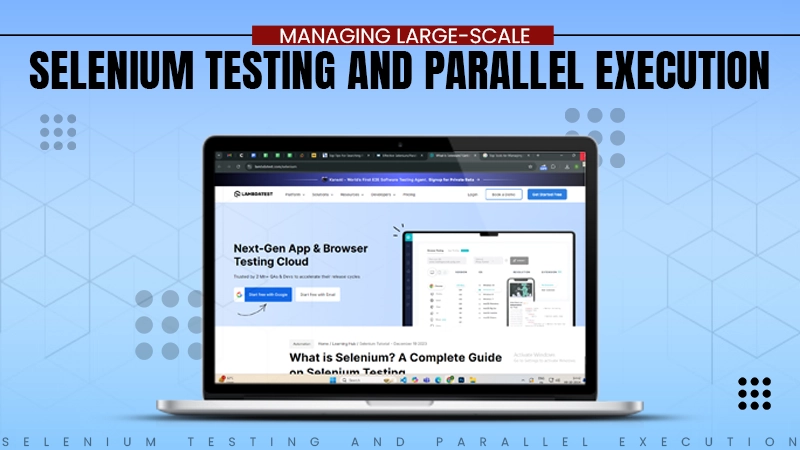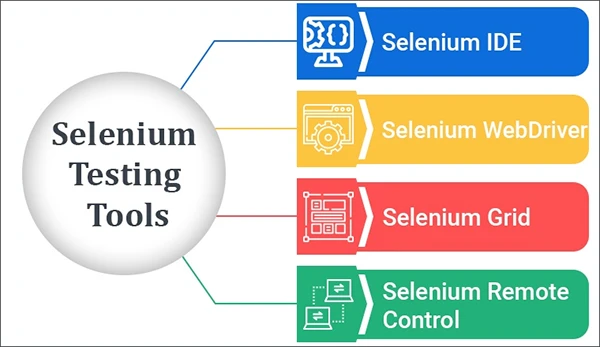

Open-source nature, flexibility, and support for multiple programming languages, selenium testing remains the priority for a majority of automation testing tools. With over 27% of the market share, according to a 2023 Stack Overflow survey, there are numerous tools that you can use for this.
Speaking of parallel execution or parallel testing, it helps developers significantly cut down on the test times, especially for CI/CD pipelines. Whereas, managing these tests is still a major task to perform. Hence, this article is going to list some tools that can help you with that.
Keep reading.
Top Tools to Handle Large-Scale Selenium Testing and Parallel Execution
One of the main strategies to handle large-scale Selenium testing is to use cloud testing tools or cloud platforms. They also support parallel execution for Selenium testing.
88% of organizations cite scaling their test automation as a top priority (Capgemini, 2021).
Below are the advanced tools that support large-scale Selenium testing and parallel execution:
LambdaTest
LambdaTest is all about enabling developers to perform cross-browser testing and parallel execution across browsers, devices, and operating systems. You can perform both manual and automated testing following tools like Selenium, Cypress, and Playwright.
- Parallel Test Execution: Run multiple tests simultaneously at a time.
- Real Device Testing: Tests can be performed on actual mobile devices as well, for more accurate results.
- CI/CD Integration: You can integrate tools like Jenkins, GitLab, CircleCI, etc. for agile workflows.
Selenium Grid
Here too, Selenium grid lets you run multiple tests parallelly without any issue. It lets you execute WebDriver scripts on remote machines and more. Be it cross-platform testing or testing across various browsers, Selenium Grid is the right one for you.
- Uses hub-node architecture to manage hub execution and nodes.
- Execute tests in various browsers and OS.
TestNG
TestNG stands for Test Next Generation. Prioritized for Java, it is an efficient testing framework to run automation testing. Compared to its rival testing frameworks like JUnit, it provides numerous advantages:
- Parallel Execution: Run numerous parallel tests.
- Data-Driven Testing: Run parameter tests by providing built-in support.
- Test Configuration: Organizing and grouping your tests will help you make them easier to run.
JUnit
One of the xUnit frameworks, JUnit is an automation testing framework for Java. With the latest release of JUnit 5, the current generation provides modern solutions for developer-side testing on the JVM. The following are some key features of JUnit:
- Annotations (e.g., @Test, @Before, @After) to structure tests.
- Assertions (e.g., assertEquals, assertTrue) to verify test outcomes.
- Integration with build tools like Maven, Gradle, and IDEs such as Eclipse and IntelliJ.
Apache Maven
Again for Java projects, Apache Maven is an open source automation testing and project management tool. The primary goal of the program is to simplify the process of building, managing project dependencies, and documenting those projects.
- Project Consistency: Takes care if the project deliverables are consistent over different stages.
- Build Automation: Tasks like compiling, testing, packaging, and deployment are automated.
- Scalability: This can be used as a plugin in various tasks beyond Java.

AMAZING FACT
Ireland is the market leader when it comes to the highest number of software testers.
Appium
Apium can be used across various operating systems like iOS, Android, and Windows. It is typically used in testing mobile applications such as native, hybrid, and mobile web apps. Across different programming languages (such as Java, Python, Ruby, etc.) it enables scripting and cross-platform testing.
- Run a single script across various platforms.
- Leverage the platform’s automation frameworks, such as UI Automator (for Android) and XCUITest (for iOS).
Robot Framework
RPA or Robotic Process Automation (RPA) is known for its simplicity, versatility, and support for keyword-driving testing. It uses Selenium for web testing, Appium for mobile testing, and REST APIs for backend testing.
- RPA emphasises a keyword-driven approach.
- With cross-platform testing, it can be used on Windows, MacOS, Linux, etc.
- Pabot plugins make it support parallel test execution.
Postman
A one-stop solution for API development that makes the process of building, testing, and managing APIs happen with ease. Here are some features:
- API Design and Development: Use OpenAPI and RAML specifications etc. to create and design APIs.
- Collaboration: Share API collections, environments, and documentation with team members for collaborative development
Allure
Being a flexible and powerful reporting tool, Allure is used for automated testing frameworks. It is primarily used in Selenium, TestNG, JUnit, and other testing libraries.
- Test Case Grouping: Group-related tests for better organizations.
- Add Attachments: Add attachments like logs, screenshots, and videos to test results for the debugging process.
- History Tracking: Keeps track of past test executions, helping teams identify trends and recurring issues.
Travis CI
Travis CI stands for Travis Continuous Integration. As the name suggests, its integration service automatically builds and tests code changes in GitHub repositories. It is quite popular among developers as it ensures software projects are always in a deployable state. The following reasons make it more amusing for professionals:
- Travis CI seamlessly integrates with GitHub.
- It can also be configured to deploy applications automatically.
Katalon Studio
Lastly, Katalon Studio is a pretty straightforward program to use. Its user-friendly design test automation tool is made for web, mobile, API, and desktop applications. The following features and reasons make it quite popular among the population of developers:
- It supports using multiple platforms for web apps, API testing, mobile apps, etc.
- Katalon studio is super easy to integrate with CI/CD tools.
- You can join the community that uses the same program and get active support.
Over 70% of users reported improved testing efficiency and collaboration after implementing advanced testing tools.
Conclusion
In conclusion, this article covered numerous tools that play a major role in managing large-scale Selenium testing and enabling parallel execution. Your team can now enhance your testing processes, as projects grow, it’s significant to select the right tools. These tools ensure effective testing and improved collaboration among team members.
You can also explore cloud platforms for Selenium testing. They allow you to test your website in different browsers efficiently. By utilizing these tools, teams can maintain high-quality standards in their software development processes.